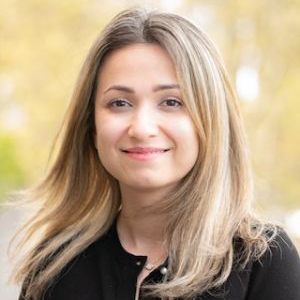

Like groups of elements on the periodic table, chemistry runs in the family for Exciton Science’s Nastaran Meftahi.
A Research Fellow at RMIT University, Nastaran builds computer models that predict the most efficient materials to use in the next generation of solar cells.
The lead author on high impact research published in the face of collective adversity in 2020 and involving collaboration with Monash University and CSIRO, she was set on the path to academic excellence early in life and hasn’t looked back.
“I had an aunt who was a successful doctor and an uncle who was a chemistry teacher,” Nastaran said.
“He used to perform little chemistry experiments for us at home. He couldn’t grab his children’s attention, but he did well with me! I was really interested.
“I was always a curious child. During high school I was motivated to learn more, and I found myself super interested in physics and chemistry.
“I used to ask my uncle a lot of questions. In Iran, family matters a lot. We were together all the time, we were technically neighbours as well, living in a small suburb. I used to take my assignment to my uncle and force him to check them and make sure I did it right to get a higher grade at school!
“For university I picked applied chemistry. From the very beginning I knew that I wanted to do a PhD. I’m very ambitious, I always wanted to aim high.”
Within Exciton Science, Nastaran has found colleagues who mirror that drive and determination to excel.
She regularly works with fellow RMIT postdoctoral researcher Dr Mykhailo Klymenko, as well as PhD candidate Adam Surmiak at Monash University and the group led by Associate Investigator Prof. Jochen Feldmann at Ludwig Maximilians Universität in Germany.
According to Nastaran, the quality of their professional relationship and the research they are producing is a testament to the Centre’s capabilities.
“I’m really fortunate, because working with good collaborators makes your life a lot easier,” she said.
“They are very accurate, they are hard workers – we are fast and we work well together.
“If I’m 100% honest, I feel like we all belong to a big family. We support each other. I gave a talk to Germany back in April and I saw so many people from the Centre that logged in to support me, it felt awesome.”
Nastaran is determined to remain immersed in the world of research and knowledge creation, crediting her supervisor, Centre Deputy Director Salvy Russo, with empowering her to pursue that goal.
She said: “I’m quite sure I want to stay in academia. I’ll do my best! It’s been two and a half years since I started being a postdoctoral researcher. I feel like I’m on the right track to establishing a career in academia.
“Having Salvy as my boss helps because Salvy is really supportive, I’m super lucky to have someone who is taking care of me. He cares about my future. He is trying to make sure I can build my career. I want to stay in academia as long as academia wants me!”
Together with many members of the Centre, Nastaran is well aware of the vital impact her research could have, as the global need to transition to clean energy generation becomes increasingly urgent.
“Climate change is a serious matter,” she said.
“We need to take it seriously. It’s already happening, we need to take action right now. We are responsible for the next generation.”

Climate change is a serious matter… It’s already happening, we need to take action right now. We are responsible for the next generation.”